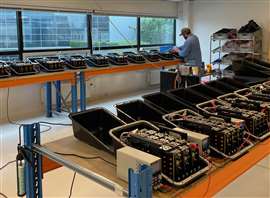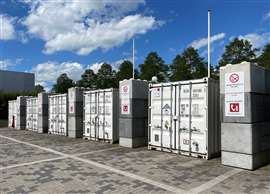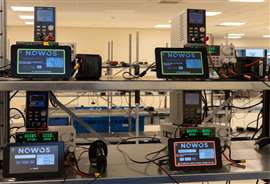Comment: sustainability and the role of battery repair in equipment rental
11 November 2024
Rental companies should explore the repair and reuse of their batteries, writes Alix Armour, the lead for circular partnerships and business development at Netherlands battery specialist Nowos.
Battery-powered equipment is integral to the modern rental industry, with electric scissor lifts, mobile lighting and even smaller construction vehicles increasingly reliant on advanced battery technology.
But as these batteries age, rental companies face critical questions about how best to maintain, repair, and maximize the lifespan of their equipment.
 The author: Alix Armour, head of circularity partnerships and business development at Nowos. (Photo: Nowos)
The author: Alix Armour, head of circularity partnerships and business development at Nowos. (Photo: Nowos)
Nowos, a Netherlands-based battery repair and refurbishment company, offers a unique lens into the shifting landscape of battery management. Since its founding in 2020, it has repaired over 250 tonnes of batteries for clients ranging from e-bike fleet operators to power tool manufacturers.
The company’s story not only highlights the benefits of battery repair but points to how strategic battery management can yield significant savings and environmental benefits.
More sustainable approach
Traditionally, when a battery started to lose capacity, it was written off as unusable and sent for recycling. However, our experience suggests a more sustainable approach.
In many cases, batteries still have substantial life left, with a repair success rate of around 93%. This provides rental companies with a clear alternative: rather than discarding or replacing underperforming batteries, they can extend battery life through repair, reducing the cost and frequency of replacements.
This approach is particularly timely as equipment rental companies, much like their counterparts in micromobility and automotive fleets, are beginning to adopt leasing models for batteries.
This model, already gaining traction in electric vehicles, allows companies to recover valuable battery materials and reduce the need to store large quantities of new batteries. The circular model ensures the most efficient use of resources, appealing to both cost-saving and environmental initiatives.
Netherlands regulations
The Netherlands has been at the forefront of battery regulation, with strict laws around battery disposal, safety standards, and recycling. The country’s framework serves as a model for other European nations aiming to manage battery life cycles more sustainably.
 Batteries under repair at Nowos’s headquarters. (Photo: Nowos)
Batteries under repair at Nowos’s headquarters. (Photo: Nowos)
Under Dutch regulations, companies must ensure that batteries with remaining life are repurposed before recycling. This mandates the refurbishment or secondary use of batteries below the 80% health threshold necessary for higher-power applications like scissor lifts.
According to the Dutch battery recycling organization, Stibat, an estimated 90% of batteries sent to recycling still have a ‘State of Health’ (SOH) above 80%. This measurement, indicating cell capacity and overall battery health, shows that batteries commonly discarded as ‘dead’ can still power lower-demand applications.
For rental companies, this highlights an untapped opportunity: rather than scrapping batteries, they can repurpose them for lower capacity needs or even sell refurbished units, thus achieving both cost efficiency and environmental goals.
Safe repairs
Battery safety is a top priority for rental companies, who must weigh the risks of reusing repaired batteries against the benefits.
 Battery storage at the Nowos facility in Amersfoort, The Netherlands. (Photo: Nowos)
Battery storage at the Nowos facility in Amersfoort, The Netherlands. (Photo: Nowos)
To address these concerns, we and other leaders in battery repair emphasize the importance of using original OEM components to maintain battery certification and safety standards.
Ensuring that batteries are repaired to original specifications not only upholds safety but also extends battery lifespan, reducing overall replacement costs.
For equipment rental, which relies heavily on customer trust, maintaining high standards in battery repairs is crucial. Companies are advised to choose well-made, repairable batteries and to source batteries from reputable manufacturers when possible.
Poorly constructed batteries can be difficult or impossible to repair safely, potentially diminishing the advantages of a repair strategy.
Battery lifecycle management
The benefits of battery repair extend beyond immediate cost savings, pointing toward a broader strategy of lifecycle management.
With regulations across Europe expected to increase, companies that invest in battery repair will be well-positioned to meet stricter environmental standards. Those that adopt a proactive approach to battery management, emphasizing repair and reuse before disposal, are likely to enjoy a competitive advantage as global and local regulations continue to evolve.
By viewing battery repair as a long-term investment rather than a quick fix, rental companies can not only reduce their environmental footprint but also significantly lower operating costs.
 Battery development work underway. (Photo: Nowos)
Battery development work underway. (Photo: Nowos)
As the rental industry transitions toward sustainable business models, our approach offers a glimpse into the future of equipment rental: one in which every battery’s life cycle is fully utilized, contributing to both economic and environmental goals.
A strategic choice
For rental companies, battery repair isn’t merely a technical service; it’s a strategic choice that supports sustainability, operational efficiency, and compliance with emerging regulations.
As exemplified by the Dutch approach, repair and reuse of batteries before disposal can lead to tangible benefits. Companies that embrace this model will not only align with global environmental initiatives but will also reduce costs and manage their inventory more effectively.
The authorAlix Armour is a French/American entrepreneur with extensive experience in mobility startups. Her mission is to accelerate circularity across sectors by connecting, promoting and developing the battery value chain. At Nowos she facilitates the circularity of critical raw materials by increasing the rate of battery repair by building partnerships in Europe. She describes this as a “natural direction that comes from the electric motorbike world.” For further information on battery repair or repair solutions, contact Steven Bradshaw, sales director, Nowos at [email protected] |
STAY CONNECTED



Receive the information you need when you need it through our world-leading magazines, newsletters and daily briefings.
CONNECT WITH THE TEAM





